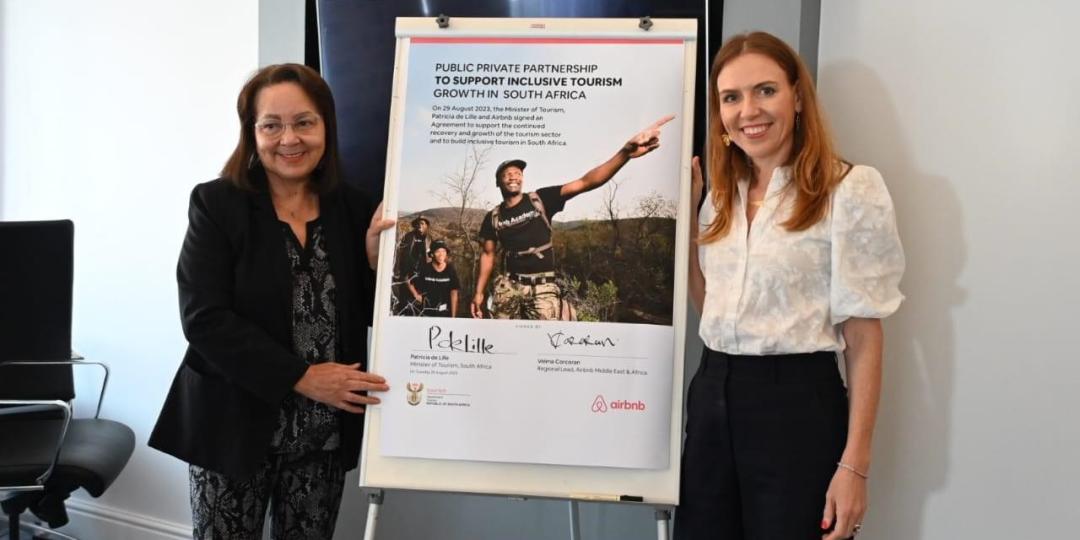The Ministry of Tourism and global accommodation platform, Airbnb, have signed a Memorandum of Understanding (MoU) to support the continued recovery of the tourism sector and build inclusive tourism in South Africa.
The MoU will see the Department of Tourism work closely with Airbnb to advance tourism services aimed at growing tourism in South Africa and creating more jobs in the sector.
Velma Corcoran, Regional Lead: Middle East Africa at Airbnb, said: “The Airbnb platform can help anyone, anywhere, to become a tourism entrepreneur, and as living costs continue to rise, we want to work together with the government to help more South Africans to participate in tourism, particularly historically disadvantaged people.
As part of the MoU, the parties will have regular engagements to evaluate opportunities for strategic collaboration on driving inclusive tourism and ensuring fair and proportionate regulation of short-term rentals.
“By leveraging Airbnb's global reach and understanding of the market, this collaboration seeks to create a positive impact on local communities, travellers, and the tourism industry as a whole. The primary goal of this collaboration is to develop a relationship between the Ministry, its department and entity, and Airbnb, to harness and drive tourism domestically and internationally,” said the Minister of Tourism, Patricia de Lille.
She pointed out that, as shared in the Department’s Green paper, insufficient information is available about the unregulated short-term rental subsector. “This hampers informed policy decision-making. Access to the Airbnb data can only assist in informing better decisions,” she added.
In terms of the MoU, Airbnb will collaborate with the Ministry of Tourism through:
1. A national registration system for short-term rentals
A national database, as per section 6 of the Tourism Act 2014, will be established for short-term rentals in South Africa to provide transparency into the short-term rental market.
The sharing of information on international best practices regarding Short Term Rentals, the registration system thereof, and the policy regulations worldwide by Airbnb will help the Department of Tourism to develop a position on short-term rentals, based not only on Airbnb input but input across the industry, to ensure fairness and transparency.
2. The Airbnb Entrepreneurship Academy
Airbnb and the Ministry of Tourism will collaborate on the Airbnb Entrepreneurship Academy, a skills development programme focused on spreading the benefits of tourism to historically disadvantaged individuals by lowering barriers to entry and providing economic empowerment.
3. Tourism insights through the City Portal
Access will be provided to an exclusive portal built for governments and tourism organisations that provides locally specific data and mutual sharing of knowledge and insights.
4. Collaboration at the Airbnb Africa Travel Summit
The Summit aims to bring together influencers, innovators and change-makers to discuss how to utilise technology to drive a more inclusive and sustainable travel future in Africa.
Taking place in Johannesburg from October 24 to 25, the Summit enables a combination of critical conversations, real solutions, and firm commitments, and the Minister will present the official welcome note. It
“We welcome the opportunity to work with the Department to develop a clear proportionate national framework for the regulation of short-term rentals is crucial and see huge power in public and private sector collaborations. We also know from our work with the Airbnb Entrepreneurship Academy, that together, we can make a tangible difference and enable more people, in more places, to benefit from tourism,” said Corcoran.
De Lille highlighted that the signing of this MoU is in line with the aims of the Tourism Sector Recovery Plan which is a key part of the country’s Economic Reconstruction and Recovery Plan.
National database
This MoU also gives the Department important insights into short-term rental activity. A national database, as per section 6 of the Tourism Act 2014, will be established for short-term rentals in South Africa to provide transparency into the short-term rental market.
In addition, Airbnb will grant the government access to the City Portal - a tool which provides economic activity data and travel trends to help governments understand Airbnb’s footprint in their communities so the Department can make evidence-based decisions.























